| |
First they came for the socialists, and I did not speak out –
Because I was not a socialist. |
| |
Then they came for the trade unionists, and I did not speak out –
Because I was not a trade unionist. |
| |
Then they came for the Jews, and I did not speak out –
Because I was not a Jew. |
| |
Then they came for me – and there was no one left to speak for me. |
| |
Pastor Martin Niemöller |
It's just a weeny bit ironic that the man who wrote one most eloquent warnings against remaining silent in the face of tyranny also voted for the Nazis and was initially a supporter of Adolf Hitler. After becoming increasingly unhappy with the Nazi government's attacks on the church, however, he began actively protesting its actions. As a result, he was arrested and spent seven years in Sachsenhausen and Dachau concentration camps, during which time he abandoned his former conservatism and began questioning why he had supported Hitler in the first place. It's the sort of buyer's remorse that is currently tearing apart our own wretched Conservative government, whose steady erosion of our rights and freedoms has gone hand-in-hand with rampant corruption and an epic level of incompetence. And with right-wing authoritarianism on the rise in various quarters in the West, Niemöller's words continue to be relevant. Not worried that the right to protest is being taken away in the UK because you're not a protestor? Unconcerned about the removal of a woman's right to bodily autonomy in the US because you're male or have never (yet) needed an abortion? Wake up people, it's not going to stop there. It hasn't stopped there. And if you cover your eyes and ears and try to ignore it, who will there be left to speak for you when a law is introduced that negatively impacts your life, your liberty, or your own dearly held beliefs? Think it won't happen? Just you wait. Not for the first time in recent years, I'm reminded of the words of German philosopher Friedrich Hegel: "The only thing we learn from history is that we learn nothing from history."
I mention Pastor Niemöller above not just for his still regularly quoted and relevant words of warning, but also because he was the inspiration for the titular lead character of the 1940 British drama, Pastor Hall, whom we first meet after he has finished his Sunday sermon and is being helped into his street clothes by his verger, Heinrich (Bernard Miles). More on him in a second. When he steps outside, he greets his adult daughter Christine (Nova Pilbeam) and her boyfriend Werner (Brian Worth), and a short while later meets up with his good friend and Paul's father, General Paul von Grotjahn (Seymour Hicks), the sort of old-school bundle of military bluff that was a familiar figure in British wartime dramas. Hall interrupts their journey home to pay a visit to elderly widow, Frau Kemp (Barbara Gott), to whom he donates a fresh chicken from his own kitchen, which irritates the hell out of his cook, whose meal preparations have clearly been disrupted by the Pastor's charitable actions several times before.
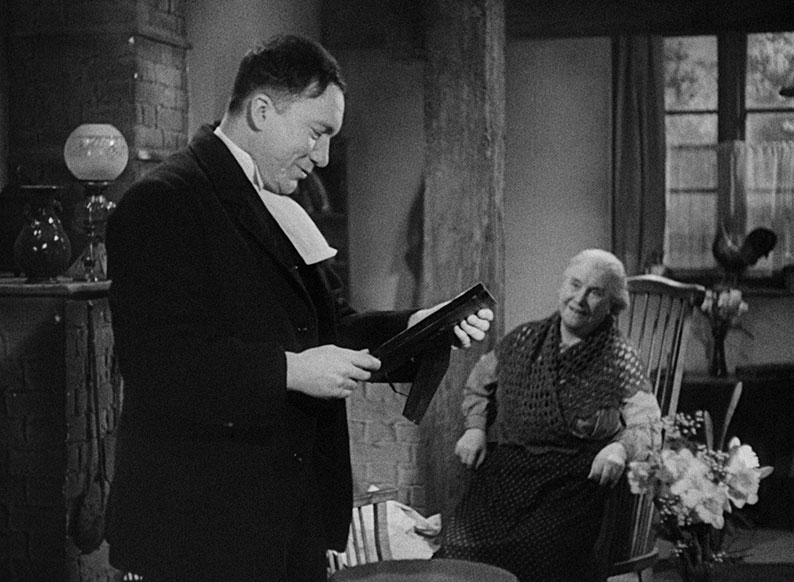
As a piece of character and scene establishment, it's all very cosy and comfortingly British in its tone, from the friendly village setting to the middle-class English accents of the cast. Except we're not in a quiet corner of the English countryside, but the small German village of Altdorf in the late 1930s, and that so-familiar Englishness of the handling and characters is soon subjected to a series of sharp punctures that act as forewarnings of terrible things to come. When we first meet Heinrich, for example, he informs Hall that this will be the last day as his verger, as after a long period of unemployment he's landed a job – as a Stormtrooper. In the context of the time and place, it's news that appears to please the Pastor. "Be fine to be working again," remarks Heinrich, "and for Germany, too," before thanking the Pastor for everything he's done for him. And yes, there is some foreshadowing in this scene. When Hall visits Frau Kemp, meanwhile, she proudly shows him a picture of her son Erich, who is posing for the camera and dressed in a Nazi uniform with a swastika band on his left arm. "Why, he's getting bigger than ever," is Hall's smiling response, unaware at this stage of the long-term implications. Again, we'll be given later cause to recall this encounter.
These quietly jarring moments are indicative of a rural populace that does not yet comprehend what a future under a government run by Adolf Hitler might mean. To these people at this point in their country's history, Heinrich and Erich are joining up to serve their country, and what could possibly be wrong with that? The answer to this question arrives in the village a short while later in the form of Stormtrooper Leader Fritz Gerte (Marius Goring), who has been sent to Altdorf to install the new spirit of National Socialism in people he is a little too quick to dismiss as backward. When he arrives at the Pastor's house, he is initially greeted by Christine, who is sceptical of his talk of making Germany "a country to be feared," but is nonetheless greeted warmly by the kindly Pastor on his return. Gerte has approached Hall to seek his cooperation as a man of influence in the village, and despite a whisper of initial uncertainty, it is proffered. "I've always believed in rendering unto Caesar that which is Caesar's," Hall admits, "And in this village, it seems you are to be Caesar." It says something that Gerte's immediate response is a no-nonsense, "Exactly. Now we can get down to business."
It's then that Hall gets his first taste of just what the imposition of National Socialist values really means when the first question asked by Gerte is, "Who are the people who should be dealt with?" Hall is understandably confused by the question, Gerte responds in a business-like manner, "Communists, socialists, pacifists, Jews, enemies of the state," which comes close to the list that was the basis for Niemöller's famous poem. Hall remains polite and respectful but admits that he is unable to assist Gerte in his nefarious quest. Gerte concludes that he's wasting his time, and sets about his work without assistance from the Pastor, who soon finds himself at odds with this new doctrine, particularly after Stormtroopers gleefully smash up the shop of an elderly local man because his grandmother was Jewish. Despite this, Hall remains on superficially cordial terms with Gerte, inviting him for dinner but seemingly unaware that this Nazi officer has taken a fancy to Christine. It's partially this that protects Hall from arrest as his opposition to the Nazi occupation of the village intensifies and his protests increase. The final straw comes when he and Christine visit Hall's old friend Veit (Percy Walsh), and discover that his 14-year-old daughter Lina (Lina Barrie) has been made pregnant by the son of a Nazi party bigwig. Although not explicitly stated – this was 1940 after all – we're left in no doubt about what occurred, particularly when the Commandant that Hall takes his complaint to snaps uncaringly, "What has happened to this girl is, after all, what she was made for." When this state of affairs ends in tragedy, Hall decides that he will publicly denounce the Nazis and list their crimes at his next sermon, unaware that a casual comment to this effect that he made to a friend has made its way via local gossip to the ears of the increasingly impatient Gerte.
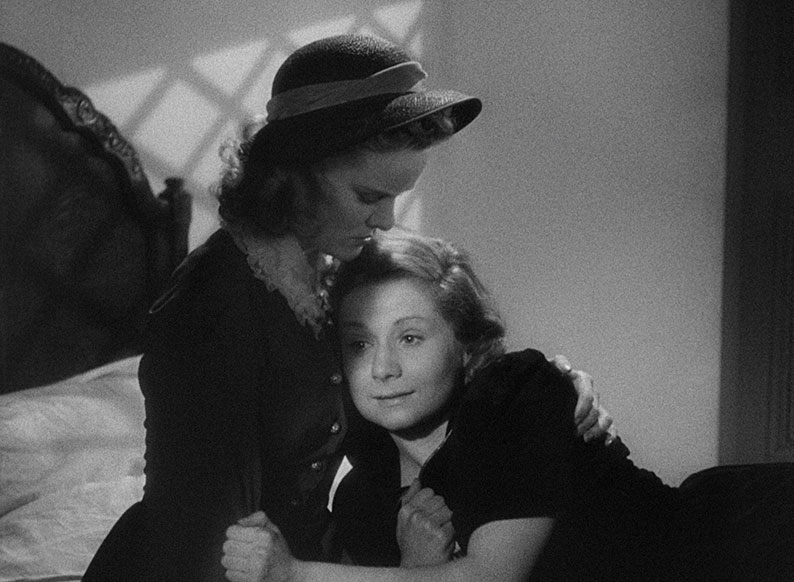
That what happens to Hall has significant differences from how things played for Niemöller is not an issue here because the film never claimed to be telling his story, much of which had yet to play out when the film was made. What the film does succeed in doing with a surprisingly level head is confront what was happening in Germany under Nazi rule, and what was inflicted on anyone who failed to cooperate or show complete loyalty to the state and its inglorious leader. To a substantial portion of a domestic audience in 1940, this must have been genuinely eye-opening, Pastor Hall being the first British film to depict the brutality inflicted on concentration camp prisoners (treatment that Niemöller was largely spared, it should be noted), and painting an unflinching picture of how forcefully and unforgivingly Nazi doctrine was being imposed. By not painting Gerte as the personification of evil and instead as a man who believes wholeheartedly in a doctrine that he could debate the importance and glories of over dinner with the Pastor – and full marks to Marius Goring here for his portrayal – the film makes the plausibility of his character his most frightening aspect. Similarly, the Boultings' determination to portray the German citizens as ordinary people who become sucked into the slipstream of a seemingly unstoppable force – whether through indoctrination or simple fear for their lives – makes it easy for the viewer to empathise with the characters and their respective fates. Here, having the German citizens played by British actors and delivering their lines in English pays real dividends. So similar are they in their ways, their words, and their accents to the characters in many a British rural drama of the day, that identifying with them is an almost autonomic process. It also serves to remind us that, despite our differing nationalities, we're really not so very different from each other after all. Now there's a message worth repeating in these depressingly xenophobic modern times.
I'll admit to knowing little about Pastor Hall before the announcement of this Blu-ray release, and quickly found myself hooked by the unfolding story. Although only the third feature from the Boulting brothers team of director Roy and producer John, it's a supremely well-made, compellingly performed and intelligent work that hits most of its targets with pinpoint accuracy without resorting to over-dramatics and exaggeration. I also found it easy to put aside my own distrust and dislike of religion, as despite Frederick Hall's role as the community Pastor, religion is not his driving force here, but an innate belief in human decency and the right of every individual – regardless of their gender, their race, or their religion – to be able to live their lives in peace and happiness. Increasingly, Hall becomes a symbol of resistance in the face of encroaching evil, albeit one whose quest may be doomed to failure in the face of an enemy of such size and power. Nonetheless, his actions and willingness to sacrifice himself for the cause if necessary serve to remind us, much as Niemöller's poem continues to do, of the importance of standing up to those who would strip us of our rights and freedoms in order to feather their own nests and advance their own crooked agendas.
The result of a 4K scan from an original nitrate positive element preserved by the BFI National Archive, with colour timing and restoration work carried out at 2K resolution by Final Frame Post in London, the 1080p transfer on Indicator's Blu-ray in some ways shows its age, but is still seriously impressive for a restoration whose source was probably not in anything like pristine condition. The contrast displays an attractive tonal range and rock solid black levels, and while the sharpness isn't going to rival the cream of restorations from this era (which usually have the advantage of being sourced from well-preserved original negatives), the level of image detail is still very good. There is some slight movement of the image in fram in places, but this is rare and for the most part hardly noticeable. Grain is visible and gives the transfer a texture that just yells "FILM!" in a way I always find pleasing, and there appears to be little sign of dirt or damage, though with one small caveat. There are a few frames missing here and there, which is at its most noticeable when characters are speaking. It rarely impedes understanding of the dialogue, but there is a single instance where a whole (short) line is effectively missing. Given the age of the film and what I presume was imperfect source material, this is easy to live with.
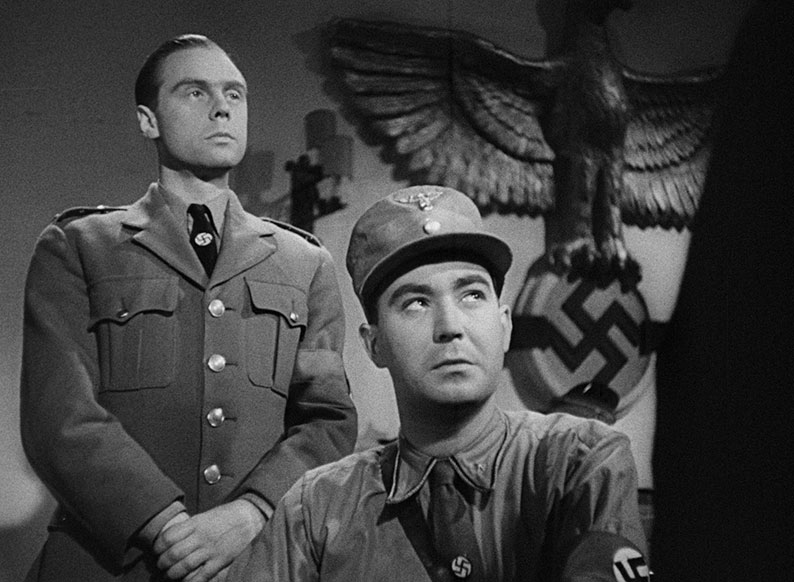
The Linear PCM 1.0 mono soundtrack has also been restored, and despite the inevitably narrow dynamic range, the dialogue is always clear, and there are no signs of any former wear, as well as a pleasing absence of background hiss and fluff.
Optional English subtitles for the deaf and hearing impaired are available.
The IWM Oral History with Roy Boulting (96:25)
Recorded in March 1980 by Kay Goldstone, this interview with Pastor Hall director Roy Boulting is in a similar vein to those conducted with various filmmakers for the British Entertainment History Project that have adorned many previous Indicator discs. Where it differs from them is that it focusses primarily on only a few crucial years of Boulting's film career. After revealing how he and his brother John first fell in love with film and how he landed his first unpaid movie work after moving to Canada, he moves on to the period in which he and John worked for the same small British distribution company and the debt he owes to the company's cameraman and editor, John Miller, from whom he learned so much about the filmmaking process. It's then, after a brief skip through brothers' first projects as director and producer, that talks about the development and making of Pastor Hall. I was genuinely surprised and rather delighted by this, as so often with the BEHP interviews we've had so far, the interviewees skip over the film that the interview accompanies, but here Boulting talks about its production in considerable and revealing detail. We learn how the chief censor's objection to even the prospect of the film almost stopped it in its tracks (more on this in the Richard Falcon interview below), but also how it was eventually released and became one of the first to show the Nazis for what they were whilst also portraying the Germans as ordinary people. The majority of the interview, however, is focussed on Boulting's work with the Army Film Unit during World War II, a discussion that is crammed with interesting detail, and is peppered with fascinating and entertaining anecdotes, including a couple involving Winston Churchill, whose distinctive voice Boulting imitates when quoting his words. A hugely engaging and enlightening inclusion that I was utterly riveted by. For the record, it runs under the film in the manner of a commentary track, and has presumably been edited to match its running time to the second. Indeed, I did wonder if the interview itself originally ran for considerably longer, and if this was perhaps just a date-relevant extract. I'm speculating here, but maybe, just maybe, there's a chance we'll hear more of it on a later Indicator release…?
Matthew Hockenos: Faith Beyond Borders (15:04)
Immediately after watching Pastor Hall, I did my usual thing and researched the life of Martin Niemöller, the real-life pastor on whom the film's title character was based. Having compiled a small wadge of notes to assist me when writing this review, I then discovered that I should have watched the special features first, particularly this webcam interview with professor and author Matthew Hockenos, whose comprehensive look at the life of this intriguing and seemingly contradictory individual covers all the ground I had researched and then some. Kicking off with Niemöller's famous poem – or confession, as it is described here – Hockenos is clear about the pastor's early conservative, pro-Nazi views, and the fact that when he did make a stand against the Nazis, his complaints related specifically to how their actions were affecting the church rather than their impact on society at large. He covers Niemöller's arrest, re-arrest, and his years spent in concentration camps, and handily details the substantial differences between what Niemöller and the film's Pastor Hall went through in this regard, as well as what happened to Niemöller after the war. He still salutes the film as a captivating depiction of the fight between the church and the Nazis. A welcome and informative extra.
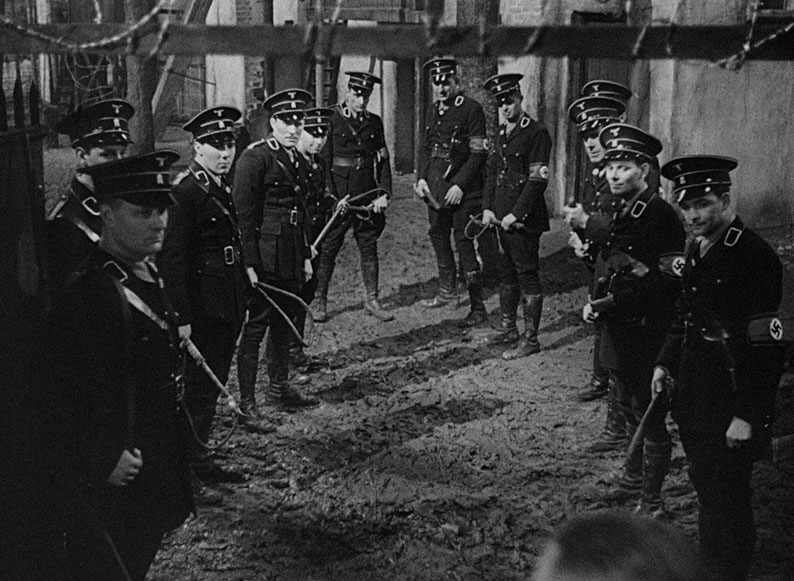
Richard Falcon: The Cutting Class (13:54)
Former BBFC examiner Richard Falcon provides a most illuminating look at the rough ride Pastor Hall had with the British censor of the day. It's worth remembering that the film was first proposed before Britain went to war with Germany and when appeasement with Hitler was government policy (or as Boulting describes it, "the stench of appeasement"). This may help explain why such strong objections were voiced against the even the prospect of a film that could be categorised as anti-Nazi, and which was dismissed by one censor as, "pure anti-Hitler propaganda." Perish the thought. Falcon outlines how Alfred Hitchcock found ways round these restrictions, and reveals that once the responsibility for political censorship was passed onto the Ministry of Information – by when Hitler was being seen for what he truly was – the film was given the go-ahead and even seen as a useful tool for helping to bring America into the war. Another hugely educational feature.
Welt in Film: 'Niemöller Speaks in Hamburg (1946) (2:25)
German newsreel footage of Martin Niemöller addressing the Evangelical Synod in Hamburg in 1946 shortly before embarking on a worldwide lecture tour, some of which was shot with synchronised sound, enabling us to hear his voice as well as see him.
Image Gallery
29 manually advanced screens featuring splendid quality monochrome production stills, the American press book covers, and six posters. Also included are scans of three photos of Eleanor Roosevelt, plus one of President Franklin D. Roosevelt and his brother Elliott, together with handwritten text informing us that they were taken in July 1949 just before Eleanor recorded her prologue for the film's American release. There's a shot of James Roosevelt at the film premiere, towering over Edward G Robinson and his daughter Jean.
The Dawn Guard (1941) (6:19)
A straightforward, initially simplistic little slice of wartime propaganda, made by the Boulting brothers for The Ministry of Information, whose message is conveyed by two Home Guard volunteers (Percy Walsh and Bernard Miles) as they watch the sun rise and ponder on the destruction that the Nazis were unleashing, words illustrated by documentary footage of English country life. This conversation then takes an interesting turn when they turn their attention to the changes that need to be made after the war to combat Britain's poverty and social inequality. It's a heartfelt appeal for the very sort of social reforms that were brought about by Clement Atlee's post-war Labour government, positive changes that all these decades later are criminally being eroded.
Minefield! (1944) (14:35)
An Army Film Unit short produced by Roy Boulting that explores the process of detecting, marking and deactivating mines in an enemy minefield to create a safe corridor for Allied military vehicles. Shot in the style of a docudrama and performed by what I presume were army personnel, it proves surprisingly compelling viewing, outlining as it does all stages of a process that was more complex I realised. The small detail is of particular interest, and there were a couple of things that really surprised me here, not least the claim – which I'm not about to dispute – that it was safe for infantry to walk over anti-tank mines. The print here is awash with small scratches, but the imagery is still distinct and the first-person and third person narration is always clearly audible.
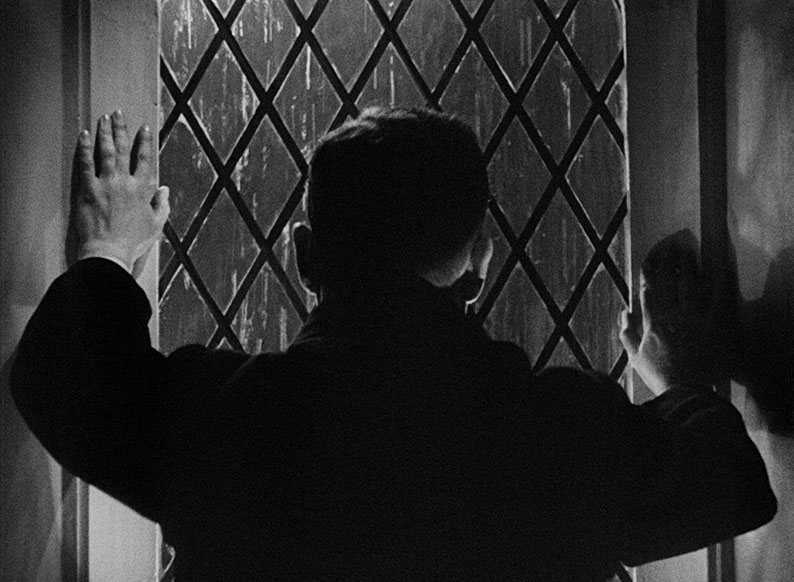
Booklet
The lead essay here is by film curator at the Imperial War Museum, Fiona Kelly, who provides a useful and nicely detailed overview of the Boulting brothers' early career, the evolution of the play by Germen Jewish writer Ernst Toller on which the screenplay by a a total of six writers – Roy and John Boulting included – was based, and the film that it ultimately gave birth to. Much – though by means all – of this is expanded on in the Roy Boulting interview, but once you've finished watching the film and want to know more, this is an excellent place to start. Next is a 1940 report from the set of Pastor Hall by Hubert Cole that was published in the March edition of Picturegoer magazine. It's an interesting piece that reminds us that the Boulting twins were just 26 when they made Pastor Hall, and that this was the first serious British-produced film about the Nazis. Cole does slight the project a little by claiming that he goes to the cinema to escape the troubles of the world, not be told about them, but salutes the Boultings' strong belief in what they are doing. Next is a piece on the prologue recorded for the film's American release by Eleanor Roosevelt. Although the prologue itself is now thought to be lost, a transcript was included in the film's pressbook, a reproduction of which is included here. What I was unaware of before reading this was that the US distribution of film was handled by the Roosevelts' son James, the one pictured in the gallery with Edward G Robinson and his daughter. Extracts from three contemporary reviews follow. The first, from the Documentary News Letter, praises the film for its power and importance as a warning of Nazi aggression. The second, from the Manchester Guardian, salutes some aspects of the film, but criticises the time spent on the brutality of the concentration camp guards (also suggesting that this is somehow old news) and the lack of focus on showing what the Nazi philosophy can do to essentially decent people. The third, authored by C A Lejeune and published in the Observer, offers some faint praise, but expresses a weariness for films about the Nazis (do me a favour) and suggests that audiences do not want to cough up money to be remined of the war. The film's box-office success would seem to suggest that he was way off on that one. The credits for The Dawn Guard and Minefield! are accompanied by brief reviews of each from the Documentary News Letter. Details of the restoration are included, as are full credits for the film, and the booklet is illustrated with promotional imagery.
A fascinating, well made, solidly performed, and important early work from one of British cinemas most crucial and creative teams. Pastor Hall has stood the test of rather time well, thanks to its unsensational approach, its sympathetic presentation of the German villagers, and the decision to portray Gerte not as an inhuman monster but an ordinary man who has been morally corrupted by the Nazi propaganda machine. It's another welcome, high quality release from Indicator, with a strong transfer backed up by some excellent special features, the cream of which for me is the Roy Boulting interview. Warmly recommended.
|